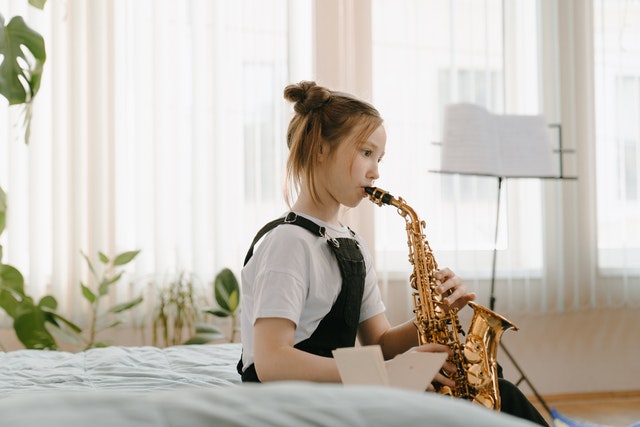Here’s How Early Kids Can Learn Saxophone:
The saxophone can be learned by children as young as eight. In addition to their age, make sure the child is big enough to hold a saxophone and responsible enough to practice and care for the instrument.
What Age Should You Begin Playing the Saxophone?
The saxophone can be learned by children as young as eight while for some the possibility of learning may be available as early as third grade in some programs. Although some programs may begin in fifth grade, when students are 10 years old, other programs may not.
It is possible for younger kids to learn to play the saxophone, but they may encounter greater challenges. Kids have shorter attention spans, which makes it difficult for them to make steady progress.
Kids under the age of eight may not be able to play the instrument safely due to their small stature. A child’s interest in playing the saxophone could be affected by this.
Do Smaller Kids Require a Different Mouthpiece?
The saxophone, not the player, determines the appropriate mouthpiece size. Smaller mouthpieces work better with some saxophones, while larger ones work better with others.
If a child is too small in size to use the mouthpiece on their saxophone, they should hold off on learning to play. A mouthpiece of average size will help you learn how to produce a sound.
Smaller and larger mouthpieces can always be experimented with in the future. If you begin using a small mouthpiece too early, you run the risk of over-exerting yourself in your performance.
Can saxophone hurt your child’s teeth?
If kids aren’t careful, playing the saxophone can lead to dental issues. There is a lot of pressure on the lips when playing the saxophone, which can cause teeth to wear down over time.
Consult with a music teacher and a dentist or orthodontist if your child wants to learn to play the instrument. In this way, you can ensure that the teeth of your child develop normally.
Playing the saxophone, especially for kids, can lead to a variety of dental issues.
Having Braces
You should plan ahead if you want your child to wear braces and play the saxophone at the same time. Your child’s dentist and orthodontist will need to know about the braces, as well as their band director or saxophone instructor.
Your child’s orthodontist can then determine ways to reduce the time your child will need braces. Taking the retainer out to play the saxophone can be discussed sooner rather than later.
Talking to the saxophone teacher and band director is also essential. With braces, playing higher notes on the saxophone can be challenging or even painful. In order for their instructor to assign them lower saxophone parts while they are wearing braces.
Your child will need to wear their retainer after their braces are removed, so do so. While they may be able to remove it in order to play the saxophone, wearing it outside of that can prevent the teeth from returning to their original position.
A person’s teeth are capable of moving
If you’re wearing braces, playing the saxophone could cause a small shift in your teeth.
As your child grows, he or she will need to be especially careful not to shift his or her teeth. You may be able to get your child braces if this is the case, but this can lead to other issues.
Long practice sessions aren’t recommended for children under the age of 18. Two 30-minute or three 20-minute sessions are better than one hour session.
It’s possible that your child would benefit from taking private saxophone lessons. A good teacher can help your child learn how to properly position their lips so that they produce a pleasing sound without having to move their teeth a great deal.
How Early Can Kids Learn Saxophone? (Right Age to Play the saxophone)
A good age for playing the saxophone is between the ages of 8 and 10 because many kids at this age are capable of carrying the instrument.
Instead of asking you to carry their instrument, your child can gain self-confidence by carrying it themselves.
When it comes to carrying and playing the saxophone, a child between the ages of 8 and 10 is a good starting point. While age is an important consideration, it’s not the only one.
How Early Can Kids Learn Saxophone? (Size Counts too)
Ensure that your child is big enough to hold the saxophone and reach the bells comfortably before purchasing one. In the event that they are unable to do so, they are probably too young to begin playing.
Taller or longer-arms kids may begin playing the saxophone earlier. As for 10-year-olds, it’s possible that they’re still too small to hold the saxophone and play it well.
How Early Can Kids Learn Saxophone? (Consider their strength)
Consider your child’s strength as well as their size when purchasing a saxophone. In comparison to other instruments, the weight of the saxophone can build up during practice.
Because of this, it can feel heavier than it actually is when held for a long period of time. Keeping practice sessions short until your child is a teenager is another reason to do so.
Ask your child to hold the saxophone in the playing position before teaching them to play. Ask them if it’s too heavy or if it’s just right.
Also, having your child practice on their arm strength now will help them when they’re old enough to play the instrument.
Begin With Brief Practice Sessions
A short burst of practice may be necessary even if your child is strong and large enough to do so on their own. Your child will be able to practice the proper technique for holding the saxophone by doing this.
Their embouchure and other fundamentals can also be worked on by them. In order to avoid overworking their muscles, you can ensure that they take a break.
When a child is still in the early stages of development, they must be cautious. Even adults’ lips can be damaged if they play the saxophone for an extended period of time
Short practice sessions can aid your children’s development without detracting from their progress.
Can Beginners Benefit from Using Lightweight Plastic Saxophone?
When it comes to learning the saxophone, plastic instruments are a great way to get started.
Because they don’t have the same weight of metal instruments, they are ideal for children who are still developing their muscle strength.
Due to their other features, these saxophones would be suitable for beginning students of all ages.
Consider these benefits of owning a plastic model, whether for your child or for you personally;
-
Affordability
As a beginner, you don’t know if you’ll stick with the saxophone. That can make it difficult to justify spending a lot of money on a metal saxophone, which can cost thousands of dollars.
Fortunately, plastic saxophones can be found for less than $500. You or your child can save a lot of money this way if you or they decide to stop playing after a few months.
In the event that your child decides to continue playing the saxophone, they can do so on a plastic one. When you have the money or confident enough, they can upgrade to a metal one, so there’s no rush to buy.
-
Durable
The saxophones of beginning players can take a lot of abuse. It’s possible that your child won’t hold the saxophone correctly, resulting in the saxophone hitting the music stand or a chair.
While good metal saxophones can withstand this, the majority of plastic saxophones can also withstand it. This means that even if your child is careless with their instrument, you won’t have to worry about expensive repairs.
Playing plastic models outdoors, such as in marching bands, is also possible. Whether it’s hot, cold, or wet, they can withstand it with ease.
-
Easy to Carry
Plastic saxophone may be easier for children to hold and carry because of their light weight. They won’t have to use as much upper body strength to keep their saxophone in the correct playing position.
Playing on a plastic saxophone will save your child from having to put in as much effort in carriage.
When Can Kids Care for a Saxophone on Their Own?
As soon as a child begins playing the saxophone, he or she can begin caring for the instrument. Younger musicians, on the other hand, may have difficulty remembering basic instrument maintenance.
The exact age at which a child should begin playing the saxophone depends on their level of interest. When a child is passionate about their instrument, they are more likely to clean their instrument.
Alternatively, a child who isn’t interested in the saxophone may not do anything to keep it in good working order. Depending on their maturity level, they may not be able to properly care for the instrument.







